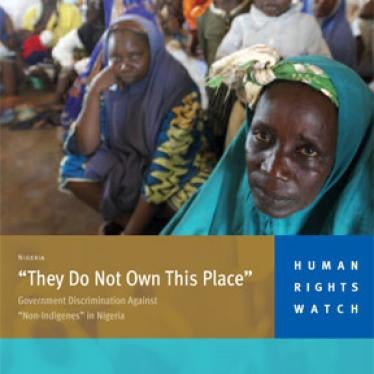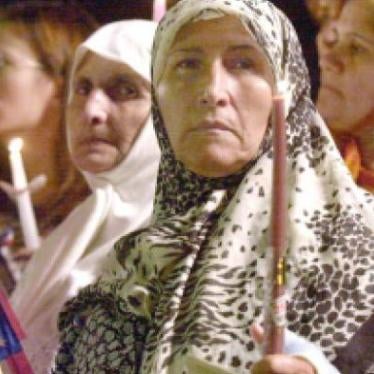The Danforth peace mission has resulted in major steps towards improving the human rights crisis in Sudan, Human Rights Watch said today. A report prepared for President Bush by former U.S. Sen. John Danforth, U.S. Special Envoy for Peace in Sudan was released today in Washington.
The report states that the parties to the long war in Sudan are serious enough about peace to warrant the energetic participation of the U.S. in a long-term peace process. The war is not winnable by either side and the time is ripe for a major push for a compromise settlement, the report concludes.
“This long-awaited report makes human rights recommendations that are crucial to the future of Sudan,” said Human Rights Watch Sudan researcher Jemera Rone.
Human Rights Watch welcomed the report’s implicit recognition that human rights violations are central to the causes of the nineteen-year civil war in Sudan, and that recently concluded agreements will require continued international monitoring to be successful. Human Rights Watch also agreed with the report's stress on constant vigilance and international monitoring of compliance with recent agreements between the government and rebel forces.
“The United States can play a key role in efforts to secure peace and human rights in Sudan,” said Rone. “Senator Danforth has made a useful contribution, and President Bush now needs to pledge the United States’ firm support for human rights as a key to the peace process.”
Since his appointment by President Bush in September 2001, Senator Danforth has successfully negotiated four important agreements between the Sudanese government and the rebel Sudan People’s Liberation Movement/Army (SPLM/A). Both the government and the SPLA have agreed to a ceasefire in the central Nuba Mountains area, as well as to cease targeting civilians and civilian objects in the civil war in the south of the country. Compliance with both these agreements is to be secured by the posting of ceasefire monitors for the Nuba Mountains and international monitors to verify the “no civilian targeting” agreement. In addition, both parties have agreed to an investigation of the issue of slavery by an international commission, and to “days of tranquility” for the carrying out of three short-term medical programs in the south.
International ceasefire monitors are already in place in the Nuba Mountains, where the ceasefire is holding. In the south, however, the verification mission is not yet in place. In the meantime, the situation of civilians remains desperate, especially in Western Upper Nile, the location of Sudan’s most active oil exploration. Government militias supported by helicopter gunships are continuing to forcibly displace people from their homes and grazing areas. The government militias on horseback have used a bridge built by an oil company at Bentiu to cross into territory previously protected from their raids by a deep river, to attack people who years ago fled over the river for safety.
Human Rights Watch called for the verification mission in the south to be deployed as soon as possible, and to be strengthened from its planned membership of fifteen in order to be able to cover the vast geographical area of the south, where transportation and communications infrastructure is primitive to nonexistent.
“The U.S., having persuaded the parties to agree to honor some human rights obligations, should spare no effort in making sure that the parties live up to these obligations. The United States should hold both parties to their commitments to implement and honor these agreements,” Rone said.
Human Rights Watch applauded the strong U.S. condemnation of the February 20, 2002 government bombing of a food distribution site in Bieh, Western Upper Nile, Southern Sudan. This government attack, by two helicopter gunships which flew so low the pilots' faces could be seen, killed twenty-four civilians waiting for emergency food rations. The U.S. immediately suspended negotiations with Khartoum. The Sudan government apologized for the killings, agreed in principle and later in writing not to target civilians or civilian objects in the war in the south, and negotiations resumed
One shortcoming of the Danforth report, according to Human Rights Watch, is that in discussing strategies for the future it elevates freedom of religion above other basic rights. This approach fails to come to grips with the broad nature of human rights violations that are the root causes of the nineteen-year-old civil war. The use of torture, prolonged arbitrary detention, extrajudicial executions, the lack of the rights to freedom of expression, association and assembly, and in particular second-class citizenship and discrimination on the grounds of race and ethnicity against many Sudanese, not only southerners, have all contributed to the current conflict. The government has continually attacked southerners in the war zones—the majority of whom practice traditional African religions—and drives them from their homes, destroying and looting homes and cattle, and then prevents emergency assistance from reaching them.
Human Rights Watch takes no position on the issue of self-determination, and it cautioned that the report's endorsement of unity in preference to self-determination should not dominate discussion of the report.
"The Danforth report is not U.S. policy at this time," Rone said. "Uproar over the self-determination point has distracted from the real human rights accomplishments of the Danforth agreements, and the need to provide substantial resources to see their implementation.





